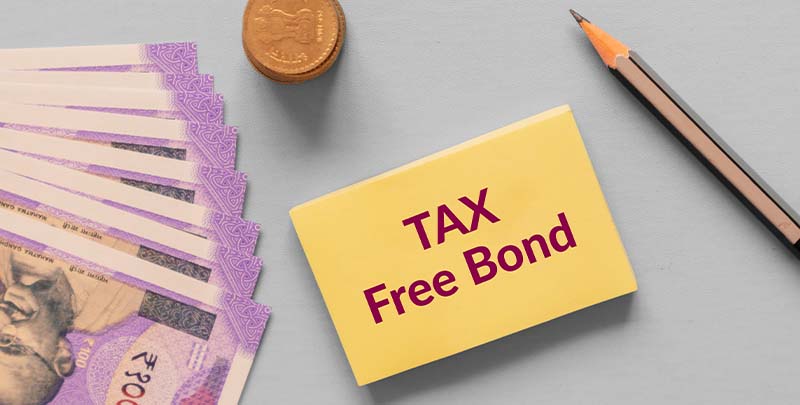If you prefer low-risk investments, you often need to make peace with earning a lower return rate than risky investments. The income tax you pay on this income further reduces the adequate returns. Investing in Tax-Free Bonds can be an excellent option to save taxes while investing funds in a low-risk investment.
What are Tax-Free Bonds?
Tax-Free Bonds are instruments that provide a fixed interest exempt from income tax. You can invest in these bonds when they are issued or buy them in the secondary market later.
Who issues Tax-Free Bonds?
Tax-Free Bonds are issued by entities incorporated or backed by the government. They raise funds for development projects such as highway construction and renewable energy infrastructure development.
Common types of Tax-Free Bonds
- Housing Bonds: Issued to finance the development of affordable housing schemes.
- Power Bonds: Issued by power companies like the Power Finance Corporation Limited for building power plants or improving electricity infrastructure in India.
- Infrastructure Bonds: Issued for projects like airports and national highways by infrastructure companies.
- Railway Bonds: Issued to improve the railway infrastructure in India.
- Public Sector Unit Bonds: Issued by public sector undertakings and government companies like HUDCO or NHAI for various projects.
Factors to consider before investing in Tax-Free Bonds
- Availability and price: The government has not issued any Tax-Free Bonds recently. You may need to buy them in secondary markets.
- Tax slab: If your income is lower than the taxable limit, Tax-Free Bonds may not be beneficial.
- Rate of return: To reap benefits, compare the tax-free rate of return with the after-tax returns of investments like Mutual Funds and Fixed Deposits.
Advantages of Tax-Free Bonds
- Regular income: These bonds provide periodic income at fixed interest rates.
- Safety: Tax-Free Bonds are safe investment instruments issued by government entities.
- Ease of trading: You can buy and sell Tax-Free Bonds digitally using Demat and Trading Accounts. Open an Axis Direct Trading and Demat Account to trade in multiple investments digitally through one account. This 3-in-1 account is a Demat Account, a Trading Account, and a Savings Account.
- Higher profit for higher tax brackets: Tax-Free Bonds are beneficial if you pay tax at higher slab rates such as 30%. The exempt income often exceeds the post-tax income of other safe investments like Fixed Deposits in your case.
Features of Tax-Free Bonds
- Tax exemption: The interest on Tax-Free Bonds is exempt from income tax under Section 10(15) without limit.
- Maturity: These bonds have varying maturity periods between 10 and 15 years.
- Investment cap: There is no upper limit for investing in these bonds.
- Diversification: You can purchase Tax-Free Bonds to diversify your portfolio.
- Low risk: Backed by government entities, Tax-Free Bonds have negligible risk.
- Liquidity: These bonds are liquid because you can trade them in the secondary market.
- Easy to buy and sell: You can trade Tax-Free Bonds online from the comfort of your home.
Who can invest in Tax-Free Bonds?
- Your income falls into higher tax brackets, and you want to save taxes.
- You are looking for a long-term, risk-free investment.
- You want to diversify your portfolio without increasing your tax liability.
Also Read: Bonds vs FD: Top 7 differences to know
Conclusion
With the ever-rising tax rates, it can be a good idea to park some of your funds in Tax-Free investments. Tax-Free Bonds truly shine among tax-saving instruments because they are extremely safe government investments.
Disclaimer: This article is for information purpose only. The views expressed in this article are personal and do not necessarily constitute the views of Axis Bank Ltd. and its employees. Axis Bank Ltd. and/or the author shall not be responsible for any direct / indirect loss or liability incurred by the reader for taking any financial decisions based on the contents and information. Please consult your financial advisor before making any financial decision.







